Advertisement
How Pixar's ‘Finding Dory’ Mainstreams The Story Of Special Needs Children

“Hi, I’m Dory. I suffer from short-term mem-mem-memory loss,” the cute big-eyed, blue tang baby recites for her parents at the beginning of “Finding Dory,” Disney Pixar’s sequel to the company’s 2003 hit digitally animated feature, “Finding Nemo.”
Dory is practicing a line, something to remember to say to strangers when — not if — she gets distracted, disoriented and lost. It’s an accommodation to help overcome her disability.
In “Finding Nemo,” Dory’s forgetfulness was played for laughs. And that’s true again in the sequel. But what makes the great Pixar films so moving is a mix of humor and sadness, so in this splendid new film, Dory’s difficulty becomes pathos.
“What if I forget you? Would you ever forget me?” baby Dory asks her parents.
“We will never forget you, Dory,” her mother reassures her. “And we know you’ll never forget us.” But, of course, Dory nearly immediately, heartbreakingly does. "Where are your parents?" a helpful fish asks. Tiny Dory replies, “I can’t remember.”
“Finding Dory” is another dazzling, heartwarming Pixar dramedy. But in this case, the central character is like a child with autism who disappears to go exploring the subway, or an adult with Alzheimer’s disease who wanders away from home. Director Andrew Stanton (a Rockport, Massachusetts, native and director of “Finding Nemo” and “Wall-E”), co-director Angus MacLane and company don’t make it explicit, but the filmmakers are mainstreaming the story of a child struggling with special needs.
Cut to Dory (voiced again by Ellen DeGeneres) all grown-up, living with the young clownfish Nemo and his father Marlin (Albert Brooks), her memory deficits getting her into mild but charming scrapes around their coral reef. Until she starts having tantalizing flashes of memories of her parents and sets off on an epic journey to find them.
“All I know is that I miss them. I really, really miss them,” Dory tells Marlin. “Do you know what that feels like?”
“Yes, I know what that feels like,” Marlin says — as we all remember him losing Nemo and searching desperately for him all across the seas in the first film.
“Please help me. I can’t do it on my own,” Dory says. “I’ll forget.”
So Marlin reluctantly agrees that he and Nemo will tag along to help. The sequel offers new dangers and old (turtle) friends. They get separated and relying on the kindness of strangers find their way back together.
Among those who provide them assistance are a cantankerous seven-tentacled octopus (one of the film’s gags is Dory dubs him a “septopus”), a nearsighted whale shark, a beluga whale convinced that his echolocation sonar abilities don’t work, a spastic loon, and an outcast sea lion. Even Nemo, if you recall, has had to learn to swim with one front fin growing smaller than the other. (“What’s wrong with his fin?” “He looks funny,” other fish-kids tease him in the original film.) Add up this whole cast of differently-abled creatures and you get a story about people with special needs, about how they make accommodations, about the unique insights they offer others, about how they succeed among everyone else.
As is Hollywood’s way, the critters’ disabilities are portrayed with heartbreaking dignity as well as played for slapstick guffaws. The whale shark is always bumping into things. Ha. The film’s joke tagline is “An unforgettable journey she probably won’t remember.” Some viewers have complained that the loon and sea lion are too loony, too much the butt of gags.
Dory, producer Lindsey Collins has said, is “surrounded by characters with their own hurdles to overcome.” But the filmmakers don’t make this a film about people with disabilities. It’s a subtle theme, an undercurrent in a familiar everyone-working-together-to-triumph-over-adversity story.
On one hand, the decision to mute this theme suggests that Disney and Pixar think America isn’t ready to buy tickets if the subject is made plain. On the other hand, by not pointing at it, by making it ordinary, perhaps this is a form of inclusion, in which disabilities are not exceptional, but embraced as part of the normally, wondrously varied spectrum of humanity.


